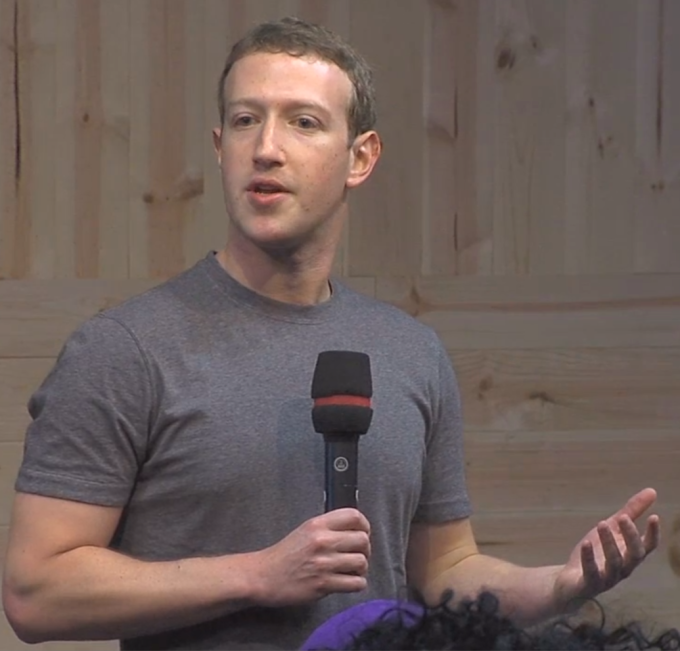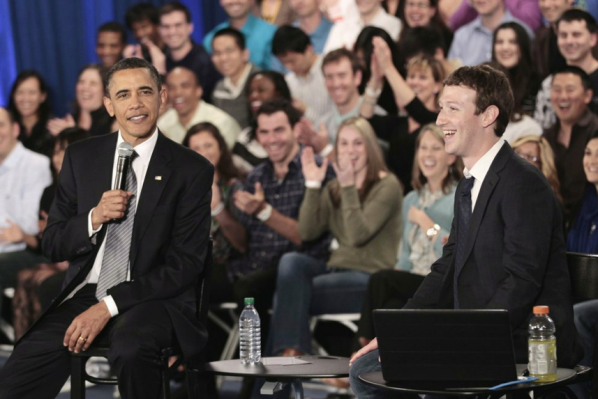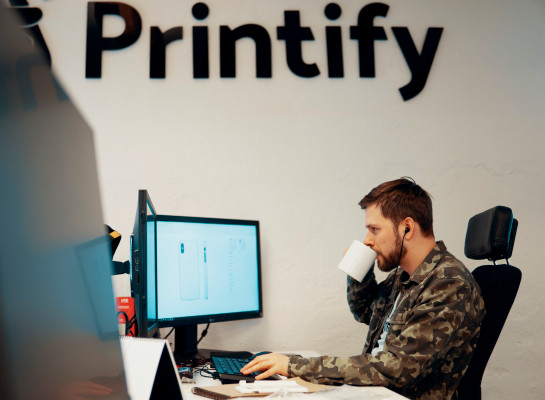Rather than just focus on Facebook’s problems like his 2018 challenge, this year Mark Zuckerberg wants to give transparency to his deliberations and invite the views of others. Today he announced his 2019 challenge will be “to host a series of public discussions about the future of technology in society — the opportunities, the challenges, the hopes, and the anxieties.” He plans to hold the talks with different leaders, experts and community members in a variety of formats and venues, though they’ll all be publicly viewable from his Facebook and Instagram accounts or traditional media.
This isn’t the first time Zuckerberg has held a series of public talks. He ran community Q&A sessions in 2014 and 2015 to take questions directly from his users. The idea for Facebook Reactions for expressing emotions beyond “Likes” first emerged during those talks.
( function() {
var func = function() {
var iframe = document.getElementById(‘wpcom-iframe-be6997fb1cb0674c242e9bfd2dfd3d7e’)
if ( iframe ) {
iframe.onload = function() {
iframe.contentWindow.postMessage( {
‘msg_type’: ‘poll_size’,
‘frame_id’: ‘wpcom-iframe-be6997fb1cb0674c242e9bfd2dfd3d7e’
}, “https://tcprotectedembed.com” );
}
}
// Autosize iframe
var funcSizeResponse = function( e ) {
var origin = document.createElement( ‘a’ );
origin.href = e.origin;
// Verify message origin
if ( ‘tcprotectedembed.com’ !== origin.host )
return;
// Verify message is in a format we expect
if ( ‘object’ !== typeof e.data || undefined === e.data.msg_type )
return;
switch ( e.data.msg_type ) {
case ‘poll_size:response’:
var iframe = document.getElementById( e.data._request.frame_id );
if ( iframe && ” === iframe.width )
iframe.width = ‘100%’;
if ( iframe && ” === iframe.height )
iframe.height = parseInt( e.data.height );
return;
default:
return;
}
}
if ( ‘function’ === typeof window.addEventListener ) {
window.addEventListener( ‘message’, funcSizeResponse, false );
} else if ( ‘function’ === typeof window.attachEvent ) {
window.attachEvent( ‘onmessage’, funcSizeResponse );
}
}
if (document.readyState === ‘complete’) { func.apply(); /* compat for infinite scroll */ }
else if ( document.addEventListener ) { document.addEventListener( ‘DOMContentLoaded’, func, false ); }
else if ( document.attachEvent ) { document.attachEvent( ‘onreadystatechange’, func ); }
} )();
 From his initial framing of the 2019 challenge, though, it already sounds like Zuckerberg sees more Facebook as the answer to many of the issues facing society. He asks, “There are so many big questions about the world we want to live in and technology’s place in it. Do we want technology to keep giving more people a voice, or will traditional gatekeepers control what ideas can be expressed? Should we decentralize authority through encryption or other means to put more power in people’s hands? In a world where many physical communities are weakening, what role can the internet play in strengthening our social fabric?”
From his initial framing of the 2019 challenge, though, it already sounds like Zuckerberg sees more Facebook as the answer to many of the issues facing society. He asks, “There are so many big questions about the world we want to live in and technology’s place in it. Do we want technology to keep giving more people a voice, or will traditional gatekeepers control what ideas can be expressed? Should we decentralize authority through encryption or other means to put more power in people’s hands? In a world where many physical communities are weakening, what role can the internet play in strengthening our social fabric?”
The implied answers there are “people should have a voice through Facebook,” “people should use Facebook’s encrypted chat app WhatsApp,” and “people should collaborate through Facebook Groups.” Hopefully the talks will also address how too much social media can impact polarization, self-image and focus.
[Update: Zuckerberg asked me in the comments of his posts for some format and speaker suggestions. My ideas include:
- A formal debate between him and a civil but pointed critic.
- An independent moderator asking him questions with no pre-brief and/or selecting questions from public submissions.
- A talk where he’s challenged to never say the word “Facebook” while discussing larger issues facing society & technology.
- A mythbusting talk where he addresses the biggest Facebook conspiracy theories. An open discussion between him and Jack Dorsey.
- A referendum where he asks or is asked questions where the public can select from multiple-choice answers, with him then discussing the publicly visible tallies.
- A discussion with an early employee like Ruchi Sanghvi, Leah Pearlman or Naomi Gleit about how Facebook’s culture and priorities have changed.
- A talk with Bill Gates and Warren Buffet on longitudinal approaches to philanthropy.
- A round-table with high-achieving high school students about the next generation’s concerns about privacy and the internet.
- A talk with the heads of Messenger (Stan Chudnovsky), Instagram (Adam Mosseri), and WhatsApp (Chris Daniels) about how the arms of the company work together.
- A panel with top Facebook Group and Page admins about what the app’s most dedicated users want from the product.]
It’s nice that one of the de facto leaders of the world will shed more light on his thoughts. But given Zuckerberg is prone to sticking to his talking points, the public would benefit from talks held by moderators who don’t give the CEO all the questions ahead of time.
Hearing Zuckerberg’s candid thoughts on the inherent trade-offs of “bringing the world closer together” or “making the world more open and connected” could help users determine whose interests he has at heart.
Zuckerberg’s past challenges have been:
2009 – Wear a neck tie every day
2010 – Learn Mandarin Chinese
2011 – Only eat animals he killed himself
2012 – Write code every day
2013 – Meet a new person who isn’t a Facebook employee every day
2014 – Write a thank-you note every day
2015 – Read a new book every two weeks
2016 – Build an artificial intelligence home assistant like Iron Man’s Jarvis
2017 – Visit all 50 states he hadn’t already to meet and talk to people
2018 – Fix Facebook’s problems
![]()
Josh Constine
Source link

